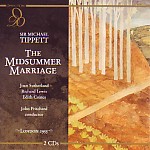It’s a little-known fact that Joan Sutherland created the role of Jennifer in Michael Tippett’s masterpiece The Midsummer Marriage at its Covent Garden premiere in the 1950s. However splendid the music, given the composer’s famously awkward style of vocal writing I’m not at all surprised that the soprano was not anxious to reprise the role in a studio recording. The opera itself came in for a good bit of ridicule too, but compared to Tippett’s later efforts this updating of The Magic Flute is the very soul of normalcy.
In any case, the bottom line is that despite the presence of Sutherland (and tenor Richard Lewis as Mark), the sound of this aircheck is so limited and fluctuates so widely (check out the opening of Act 3) that only the most hard-core fans of the singers need bother. If you love the work, you’ll be pleased to know that Colin Davis’ fabulous stereo recording has just resurfaced (for the second time) on Lyrita in great sound, with equally fine soloists and an orchestra that sounds much less stressed. That’s still the way to go, though I certainly wouldn’t mind the appearance of a competitive modern alternative just to add another dimension to the work’s interpretive possibilities. This grotty old relic certainly doesn’t do that trick.
































